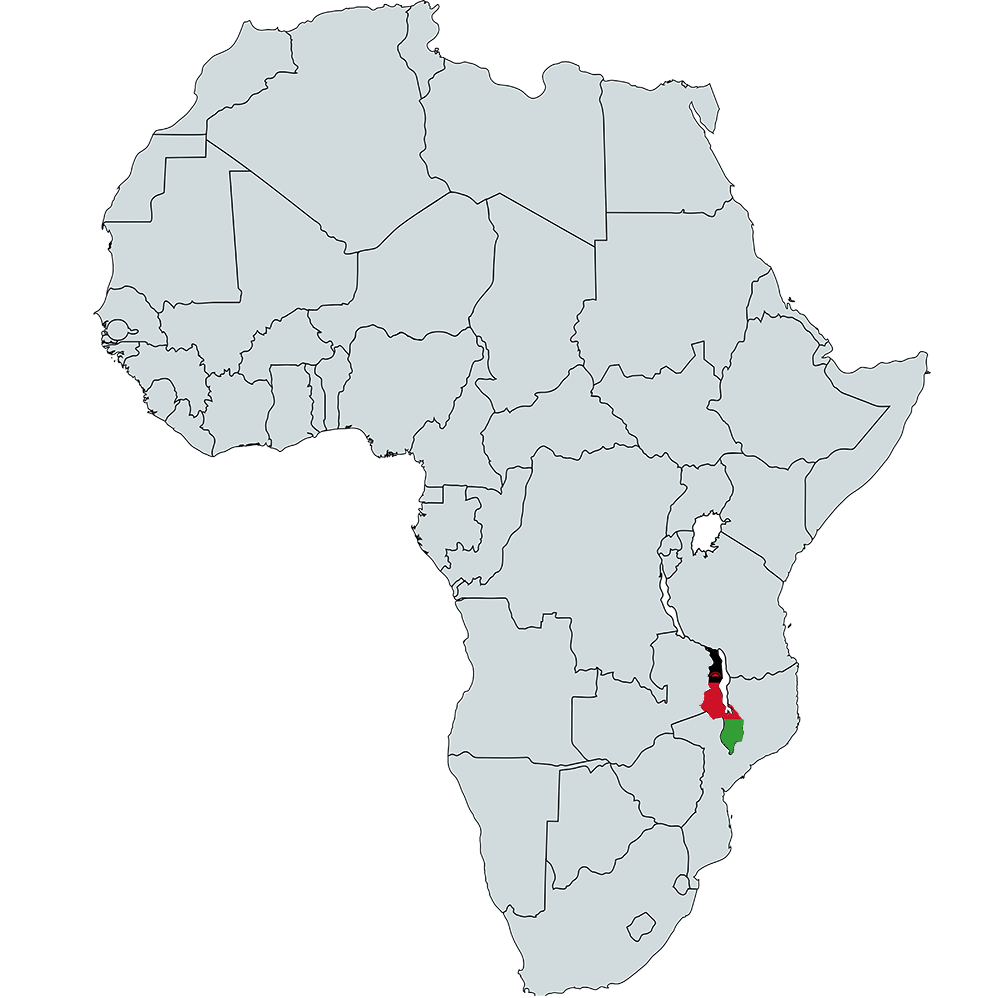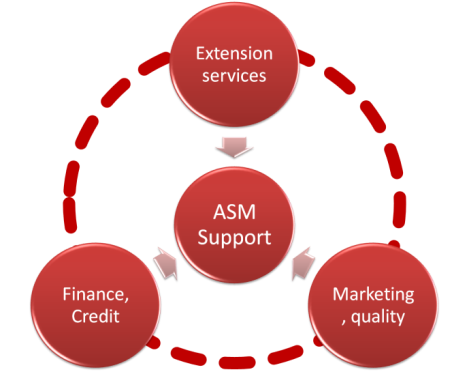
Malawi ASM Profile Political Economy & Strategic Standpoints | Social and Environmental Factors | Local linkages | ASM Sites in Malawi
The ASM sector in Malawi is mostly about informal exploitation of gemstones, gold, talc, coal, gypsum, limestone, coal, dimension stone, construction materials and clay. The size of sector is not well determined; the number of people active in the sector is estimated to be approximately 40,000. It is said that a large percentage of these are women.
Country Mining Vision Status
CMV Processes Underway.
Policies, Laws and Regulations Currently in Effect
Mines and Minerals Policy of Malawi, 2013
Malawi Mines and Minerals Act, 2013
ASM Associations or Cooperatives
I. MAWIMA: Malawi Women Mining Association
II. GAM: Gemstone Association of Malawi
ASM Definition Criterion
Nationality
ASM Licensing
Artisanal: NA
Small Scale Mining: YES
ASM Minerals or Metals Exploited
Precious Metals Gold
Base Metals Cooper, Cobalt, Nickel, Manganese, Tin
Precious Stones Gemstones
Development Minerals Dimension stones, limestone, gypsum, talc, coal, construction materials and clay
ASM SUPPORT TRIANGLE

Mining Code Provisions for Women in ASM
Mines and Minerals Policy of Malawi; 2013
Policy Preface: The Policy seeks to stimulate and guide private mining investment by administering, regulating and facilitating the growth of the sector through a well-organized and efficient institutional framework. The Government will also intensify provision of extension services to the artisanal and small-scale miners and women miners.
Policy Objectives :
vii. To promote women in Mining
6.0 SOCIAL ISSUES:
6.1 Background :
Mining can be associated with a number of social issues that need to be taken into consideration. Such challenges include child labour, occupational health, HIV and AIDS, gender issues and other social injustices.
6.1.1 Issues :
iv. Gender inequality at the work place
Malawi Mines and Minerals Act, 2013 :
DRAFT National ASM Policy 2014 :
Policy Objectives :
iv. To address gender and social issues associated with ASM
3.5 Socio-economic issues
Mining can be associated with a number of social issues that need to be taken into consideration. Such challenges include child labour, occupational health, HIV and AIDS, gender issues and other social injustices.
3.5.2 Gender
The problem affects both men and women in the ASM operations. Women, however tend to experience most challenges with regards to gender, despite the fact that they play a significant role in the ASM sub-sector.
3.5.2.1 Issues
In the ASM sub-sector women face more challenges than men. These challenges include; difficulties in accessing financial, technical and legal support, ill socioeconomic perceptions about their status; and unfair cultural traditions that impose a heavy family burden and limit their independence and ,mobility.
Policy Statements : The policy will ensure equal participation in the ASM sub-sector
3.5.4 HIV and AIDS :
…In addition, young women and mother struggling to earn a living, tend to get involved in sex trade and prostitution to support themselves and their families. As a consequence of these social challenges, HIV and AIDS is a growing concern in all small scale mining communities…
ANNEX I: POLICY IMPLEMENTATION PLAN :
| POLICY STATEMENT | OBJECTIVE | STRATEGY | ACTIVITIES | TIME FRAME | RESPONSIBILITY | OUTPUTS | BUDGET |
|---|---|---|---|---|---|---|---|
| Address social issues in the mining and minerals sector. | Ensure gender balance in the minerals sector | Promote gender balance in the mining activities |
i) Implement Gender Policy ii) Ensure mining companies employ more female workers |
2013-Onwards | MoGCDCD/ MoM /MoL/DOM/ MoJCA | Gender balance improved |
Finance and credit
According to the 2015/16 Malawi Economic Fiscal Statement, the government recognises the role Artisanal and Small-Scale Mining (ASM) plays in economic growth and poverty reduction in Malawi. Currently, ASM focuses on industrial minerals, gemstones and quarry. In 2015/16 financial year, Government was to continue implementing support to the Small-Scale Mineral Production Project which aims at developing capacity of staff and ASM in lime, graphite, glass sands and salt production. Specifically, the project is expected to promote value addition in artisanal and small-scale mining and to increase their access to soft loans from the lending institutions. Under this project, ASM Cooperatives will be established. In addition, training in appropriate technology, environmental management and occupational health and safety standards will be provided. The Government also plans to establish a robust monitoring mechanism to curb smuggling of precious and semiprecious stones in the sector. The Government will continue drafting the ASM Policy which will ultimately help regularise ASM activities.
Extension services - a phased approach to integration and capacity-building
Still based on the 2015/2016 Economic Fiscal Statement, the Government recognises that enhancing human and infrastructure capacity is critical for the development of the mining sector. In this regard, the Government has planned to build capacity in both human and infrastructure within the mining sector. This will include, among others the procurement of modern geological mapping and mineral exploration equipment; mineral processing and inspection equipment; rehabilitation of mineral laboratories and introducing specialised geological and mining courses in tertiary institutions and training of officers at various levels in mining related courses.
Marketing and quality
Within the 2014 Draft National ASM Policy, the sections of the policy on marketing systems are as follows:
3.1.6 Formal Minerals Marketing Systems :
Artisanal and small scale miners face problems in securing markets for their mineral products
3.1.6.1 Issues :
The ASM sector faces challenges in promotion of mineral marketing arrangements that are receptive to the need of the subsector. The subsector faces this problem because it has been hampered by the lack of; institutions to facilitate mineral marketing in the country, local mineral pricing systems, strategies or incentives to discourage illegal mineral trading, under-declaration of mineral product values and inadequate marketing centres located strategically in the major mining areas.
Policy Statements:
Government will facilitate establishment of mineral marketing centres;
The policy will promote the growth of both competitive local and export mineral markets for ASM products; and
Government will promote and facilitate participation of artisanal and small scale miners in Exhibitions, Trade Fairs and through foreign missions.
Within the Mines and Minerals Policy of Malawi, 2013. The sections of the policy on minerals marketing are as follows:
2.3 Promotion and Marketing
The minerals sector has not been adequately promoted and marketed; as a result, the resources remain unknown and largely unexploited. There is therefore need to aggressively promote the mining sector in order to attract investments in the sector.
2.3.1 Issues
(i) There is inadequate promotion of the minerals sector;
(ii) Lack of a body to spearhead investment in the mineral sector;
(iv) Local companies have insufficient technical and financial capacity to participate in mining; and
(v) There is inadequate and insufficient local expertise in the geological and mining fields.
2013 Mines and Minerals Policy Statement:
(a) Government will vigorously encourage both foreign and local investors to invest in the mining sector;
(b) Government will provide adequate resources to promote and market the mining sector;
(c) Government will promote training in geology and mining;
(d) Government will create a department that will promote investments in mining;
(e) Government will create an investment vehicle to participate and invest in mining ventures on behalf of Government; and
(f) Government will encourage lending institutions to provide loans to local companies to invest in mining

